34.3 Happiness
34-
People aspire to, and wish one another, health and happiness. And for good reason. Our state of happiness or unhappiness colors everything. Happy people perceive the world as safer and feel more confident. They are more decisive and cooperate more easily. They rate job applicants more favorably, savor their positive past experiences without dwelling on the negative, and are more socially connected. They live healthier and more energized and satisfied lives (Boehm et al., 2015; De Neve et al., 2013; Mauss et al., 2011; Stellar et al., 2015).
Moods matter. When your mood is gloomy, life as a whole seems depressing and meaningless—
feel-
Moreover—
The reverse is also true: Doing good also promotes good feeling. One survey of more than 200,000 people in 136 countries found that, nearly everywhere, people report feeling happier after spending money on others rather than on themselves (Aknin et al., 2013; Dunn et al., 2014). Feeling good even increases people’s willingness to donate kidneys. And kidney donation leaves donors feeling good (Brethel-
Positive Psychology
positive psychology the scientific study of human flourishing, with the goals of discovering and promoting strengths and virtues that help individuals and communities to thrive.
subjective well-being self-
William James was writing about the importance of happiness (“the secret motive for all [we] do”) as early as 1902. By the 1960s, the humanistic psychologists were interested in advancing human fulfillment. In the twenty-
 To test your own well-
To test your own well-
Taken together, satisfaction with the past, happiness with the present, and optimism about the future define the positive psychology movement’s first pillar: positive well-
Positive psychology is about building not just a pleasant life, says Seligman, but also a good life that engages one’s skills, and a meaningful life that points beyond oneself. Thus, the second pillar, positive character, focuses on exploring and enhancing creativity, courage, compassion, integrity, self-
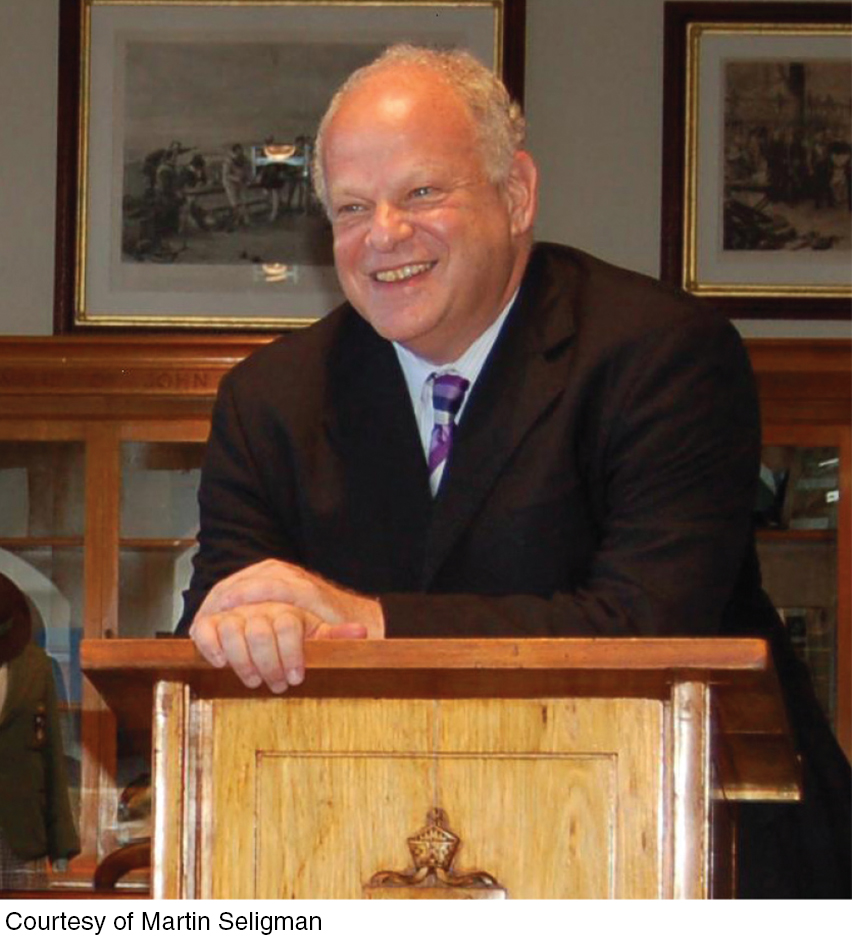
The third pillar, positive groups, communities, and cultures, seeks to foster a positive social ecology. This includes healthy families, communal neighborhoods, effective schools, socially responsible media, and civil dialogue.
“Positive psychology,” Seligman and colleagues have said (2005), “is an umbrella term for the study of positive emotions, positive character traits, and enabling institutions.” Its focus differs from psychology’s traditional interests during its first century, when attention was directed toward understanding and alleviating negative states—
In ages past, times of relative peace and prosperity have enabled cultures to turn their attention from repairing weakness and damage to promoting what Seligman (2002) has called “the highest qualities of life.” Prosperous fifth-
What Affects Our Well-Being?
34-
 See LaunchPad’s Video: Naturalistic Observation below for a helpful tutorial animation about this type of research design.
See LaunchPad’s Video: Naturalistic Observation below for a helpful tutorial animation about this type of research design.
THE SHORT LIFE OF EMOTIONAL UPS AND DOWNS Are some days of the week happier than others? In what is likely psychology’s biggest-
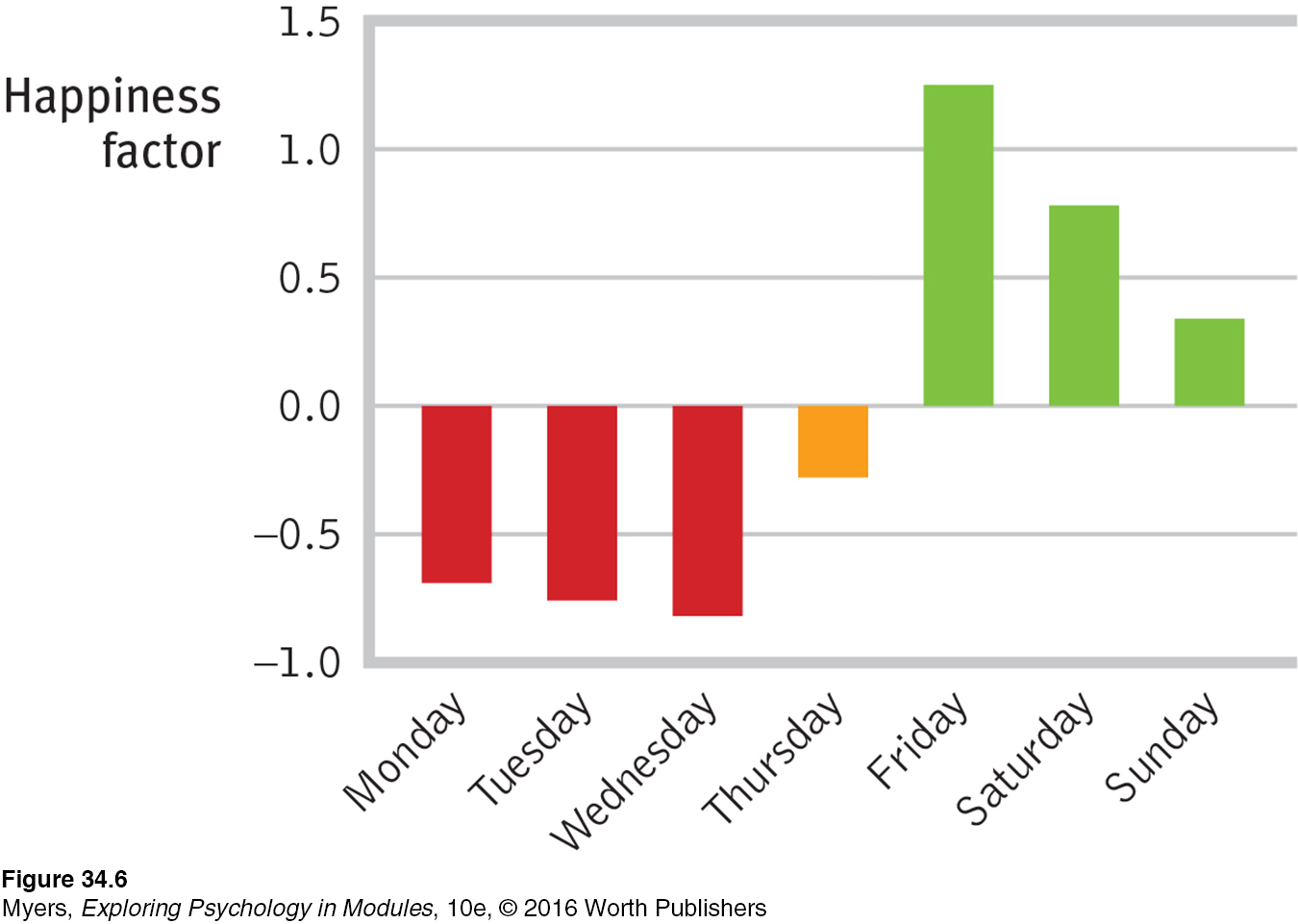
“No happiness lasts for long.”
Seneca, Agamemnon, C.E. 60
Over the long run, our emotional ups and downs tend to balance out. This is true even over the course of the day. Positive emotion rises over the early to middle part of most days and then drops off (Kahneman et al., 2004; Watson, 2000). A stressful event—
Even when negative events drag us down for longer periods, our bad mood usually ends. A romantic breakup feels devastating, but eventually the wound heals. In one study, faculty members up for tenure expected their lives would be deflated by a negative decision. Actually, 5 to 10 years later, their happiness level was about the same as for those who received tenure (Gilbert et al., 1998).
Grief over the loss of a loved one or anxiety after a severe trauma (such as child abuse, rape, or the terrors of war) can linger. But usually, even tragedy is not permanently depressing. People who become blind or paralyzed may not completely recover their previous well-
The surprising reality: We overestimate the duration of our emotions and underestimate our resiliency.
“Weeping may tarry for the night, but joy comes with the morning.”
Psalm 30:5
WEALTH AND WELL-
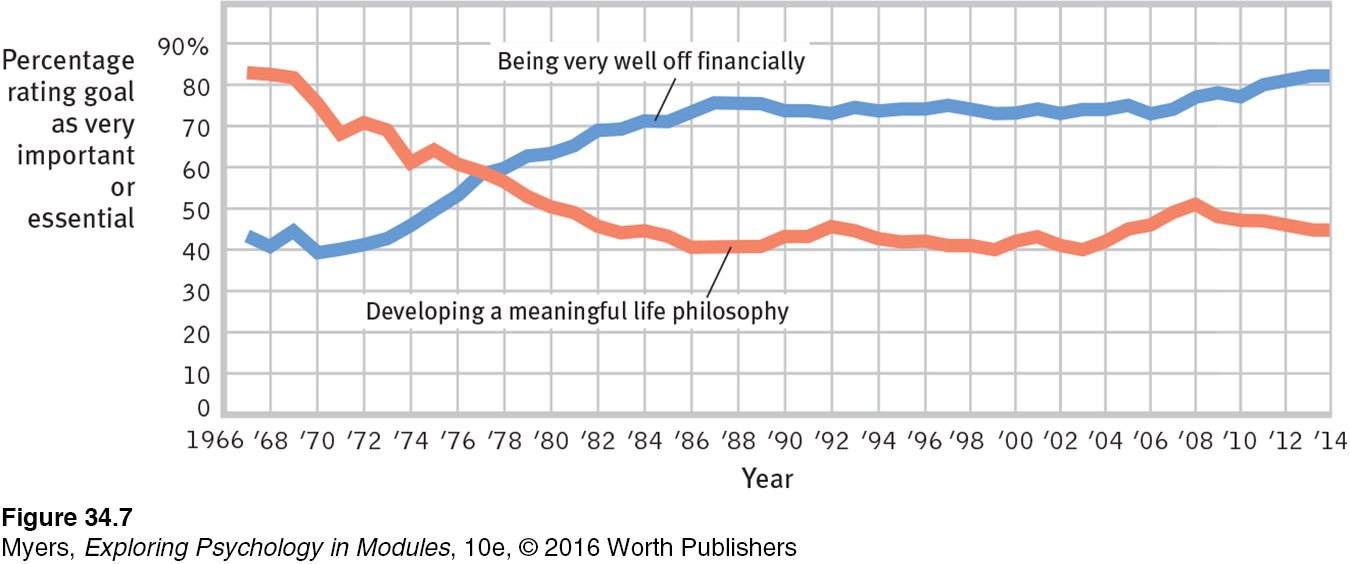
Money does buy happiness, up to a point. Having enough money to buy your way out of hunger and to have a sense of control over your life predicts greater happiness (Fischer & Boer, 2011). As Australian data confirm, the power of more money to increase happiness is strongest at low incomes (Cummins, 2006). A $1000 annual wage increase does a lot more for the average person in Malawi than for the average person in Switzerland. Raising low incomes will increase happiness more than will raising high incomes.
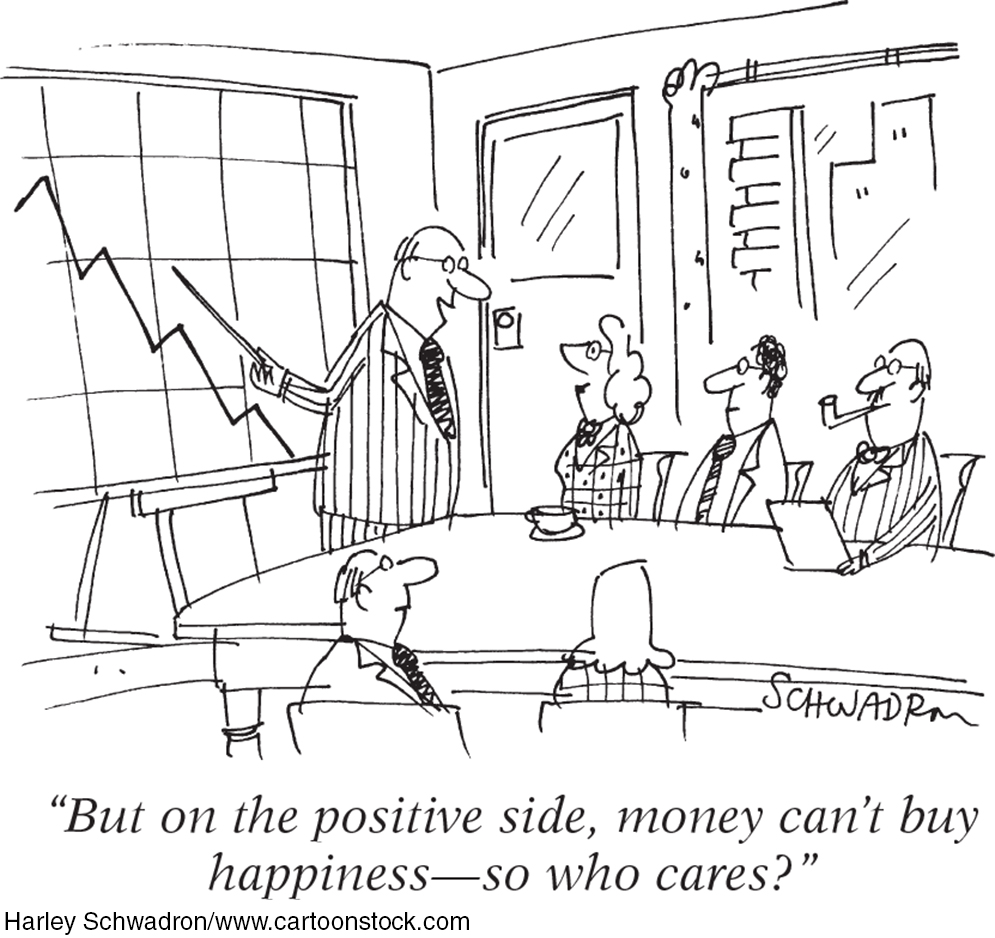
Once we have enough money for comfort and security, piling up more and more matters less and less. Experiencing luxury diminishes our savoring of life’s simpler pleasures (Cooney et al., 2014; Quoidbach et al., 2010). If you ski the Alps once, your neighborhood sledding hill pales. If you ski the Alps every winter, it becomes an ordinary part of life rather than an experience to treasure (Quoidbach et al., 2015).
And consider this: During the last half-
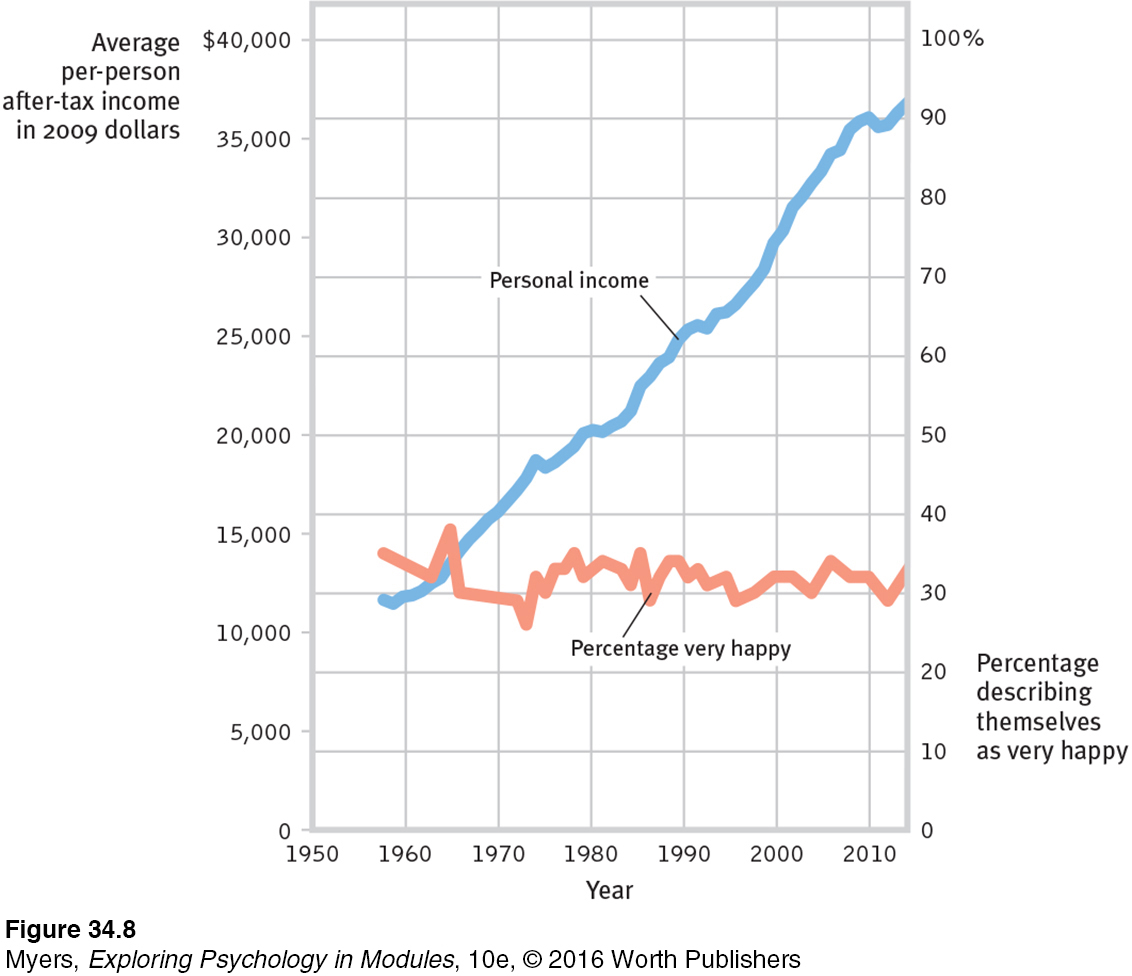
HAPPINESS IS RELATIVE: ADAPTATION AND COMPARISON Two psychological principles explain why, for those who are not poor, more money buys little more than a temporary surge of happiness and why our emotions seem attached to elastic bands that pull us back from highs or lows. In its own way, each principle suggests that happiness is relative.
adaptation-level phenomenon our tendency to form judgments (of sounds, of lights, of income) relative to a neutral level defined by our prior experience.
HAPPINESS IS RELATIVE TO OUR OWN EXPERIENCE The adaptation-level phenomenon describes our tendency to judge various stimuli in comparison with our past experiences. As psychologist Harry Helson (1898-
“I have a ‘fortune cookie maxim’ that I’m very proud of: Nothing in life is quite as important as you think it is while you are thinking about it. So, nothing will ever make you as happy as you think it will.”
Nobel laureate psychologist Daniel Kahneman, Gallup interview, “What Were They Thinking?” 2005
So, could we ever create a permanent social paradise? Probably not (Campbell, 1975; Di Tella et al., 2010). People who have experienced a recent windfall—
relative deprivation the perception that one is worse off relative to those with whom one compares oneself.
HAPPINESS IS RELATIVE TO OTHERS’ SUCCESS We are always comparing ourselves with others. And whether we feel good or bad depends on who those others are (Lyubomirsky, 2001). We are slow-
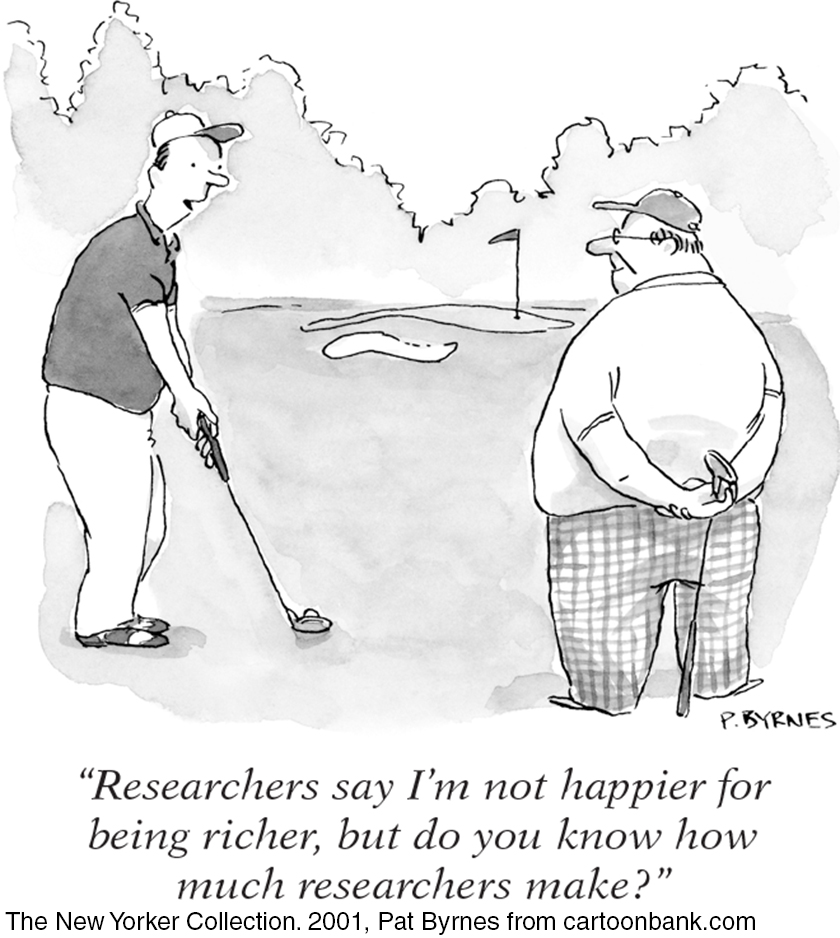
When expectations soar above attainments, we feel disappointed. Thus, the middle-
 For a 6.5-
For a 6.5-
The effect of comparison with others helps explain why students of a given level of academic ability tended to have a higher academic self-
Over the last half-
“Comparison is the thief of joy.”
Attributed to Theodore Roosevelt
Just as comparing ourselves with those who are better off creates envy, so counting our blessings as we compare ourselves with those worse off boosts our contentment. In one study, university women considered others’ deprivation and suffering (Dermer et al., 1979). They viewed vivid depictions of how grim city life could be in 1900. They imagined and then wrote about various personal tragedies, such as being burned and disfigured. Later, the women expressed greater satisfaction with their own lives. Similarly, when mildly depressed people have read about someone who was even more depressed, they felt somewhat better (Gibbons, 1986). “I cried because I had no shoes,” states a Persian saying, “until I met a man who had no feet.”
What Predicts Our Happiness Levels?
34-
Happy people share many characteristics (TABLE 34.1 below). But why are some people normally so joyful and others so somber? Here, as in so many other areas, the answer is found in the interplay between nature and nurture.
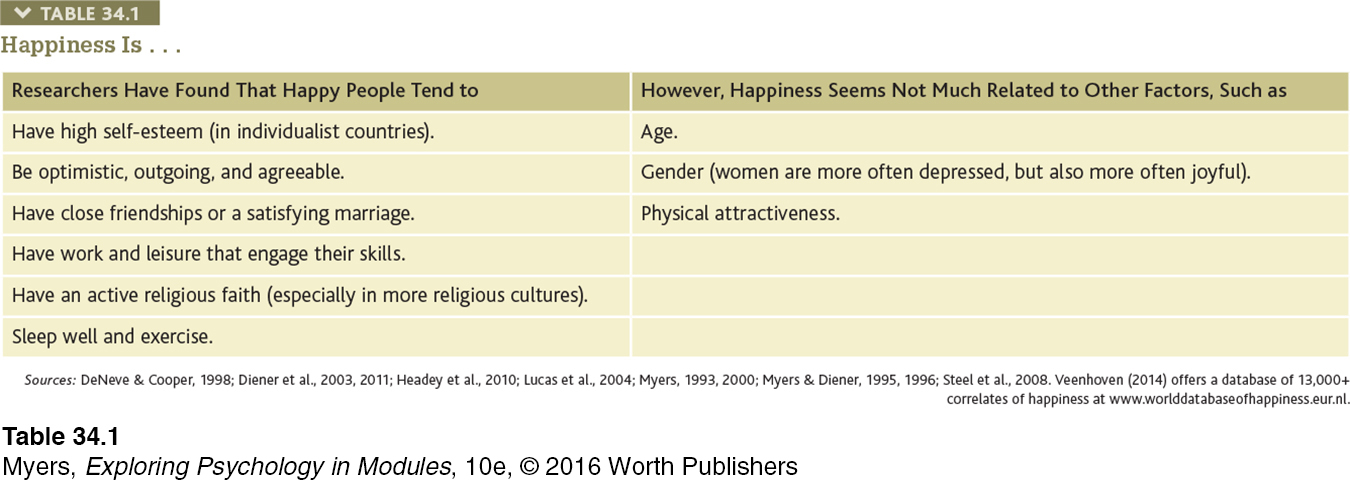
Genes matter. In one study of hundreds of identical and fraternal twins, about 50 percent of the difference among people’s happiness ratings was heritable—
But our personal history and our culture matter, too. On the personal level, as we have seen, our emotions tend to balance around a level defined by our experience. On the cultural level, groups vary in the traits they value. Self-
Depending on our genes, our outlook, and our recent experiences, our happiness seems to fluctuate around our “happiness set point,” which disposes some people to be ever upbeat and others more negative. Even so, after following thousands of lives over two decades, researchers have determined that our satisfaction with life can change (Lucas & Donnellan, 2007). Happiness rises and falls, and it can be influenced by factors that are under our control. A striking example: In a long-
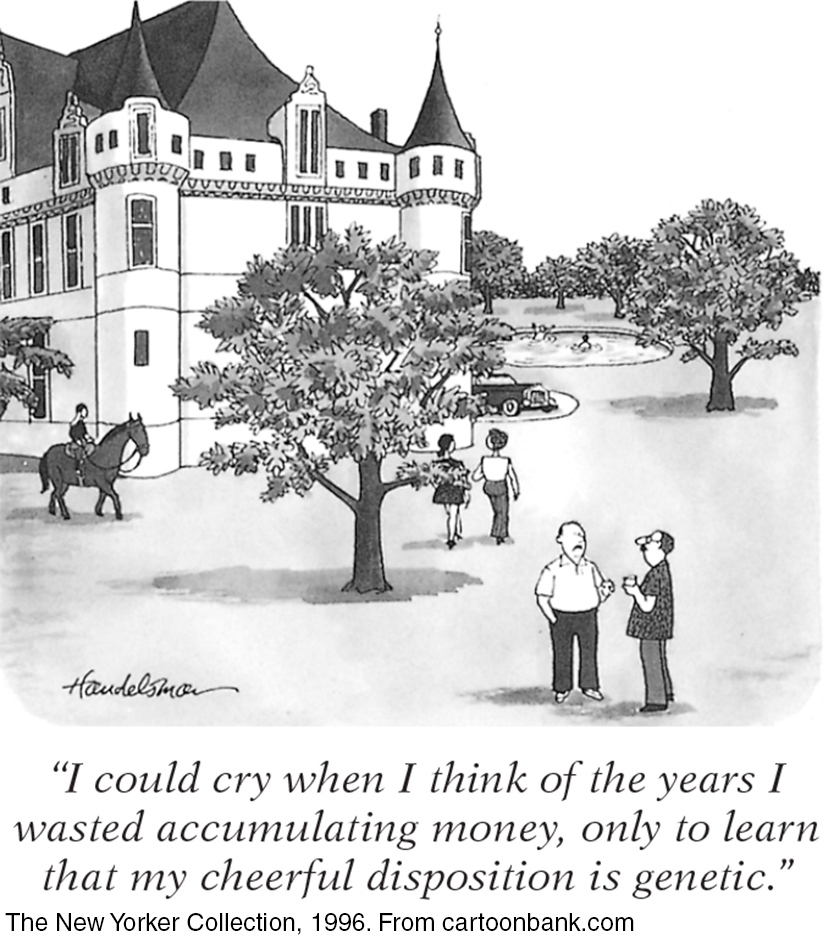
If we can enhance our happiness on an individual level, could we use happiness research to refocus our national priorities more on the pursuit of happiness? Many psychologists believe we could. Ed Diener (2006, 2009, 2013), supported by 52 colleagues, has proposed ways in which nations might measure national well-
Evidence-Based Suggestions for a Happier Life1
Your happiness, like your cholesterol level, is genetically influenced. Yet as cholesterol is also influenced by diet and exercise, so happiness is partly under your control (Layous & Lyubomirsky, 2014; Nes, 2010). Here are 11 research-
Realize that enduring happiness may not come from financial success. We adapt to change by adjusting our expectations. Neither wealth, nor any other circumstance we long for, will guarantee happiness.
Take control of your time. Happy people feel in control of their lives. To master your use of time, set goals and divide them into daily aims. We all tend to overestimate how much we will accomplish in any given day. The good news is that we generally underestimate how much we can accomplish in a year, given just a little daily progress.
Act happy. Research shows that people who are manipulated into a smiling expression feel better. So put on a happy face. Talk as if you feel positive self-
esteem, are optimistic, and are outgoing. We can often act our way into a happier state of mind. Seek work and leisure that engage your skills. Happy people often are in a zone called flow—absorbed in tasks that challenge but don’t overwhelm them. Passive forms of leisure (watching TV) often provide less flow experience than active forms, such as exercising, socializing, or expressing your musical interests.
Buy shared experiences rather than things. Compared with money spent on stuff, money buys more happiness when spent on experiences that you look forward to, enjoy, remember, and talk about (Carter & Gilovich, 2010; Kumar & Gilovich, 2013). This is especially so for socially shared experiences (Caprariello & Reis, 2012). The shared experience of a college education may cost a lot, but, as pundit Art Buchwald said, “The best things in life aren’t things.”
Join the “movement” movement. Aerobic exercise can relieve mild depression and anxiety as it promotes health and energy. Sound minds reside in sound bodies.
Give your body the sleep it wants. Happy people live active lives yet reserve time for renewing sleep and solitude. Many people suffer from sleep debt, with resulting fatigue, diminished alertness, and gloomy moods.
Give priority to close relationships. Intimate friendships can help you weather difficult times. Confiding is good for soul and body. Compared with unhappy people, happy people engage in less superficial small talk and more meaningful conversations (Mehl et al., 2010). So resolve to nurture your closest relationships by not taking your loved ones for granted. This means displaying to them the sort of kindness you display to others, affirming them, playing together, and sharing together.
Focus beyond self. Reach out to those in need. Perform acts of kindness. Happiness increases helpfulness (those who feel good do good). But doing good also makes us feel good.
Page 438Count your blessings and record your gratitude. Keeping a gratitude journal heightens well-
being (Emmons, 2007; Seligman et al., 2005). When something good happens, take time to appreciate and savor the experience (Sheldon & Lyubomirsky, 2012). Record positive events and why they occurred. Express your gratitude to others. Nurture your spiritual self. For many people, faith provides a support community, a reason to focus beyond self, and a sense of purpose and hope. That helps explain why people active in faith communities report greater-
than- average happiness and often cope well with crises.

RETRIEVE IT
Question
Which of the following factors do NOT predict self-
a. Age
b. Personality traits
c. Close relationships
d. Gender
e. Sleep and exercise
f. Active religious faith